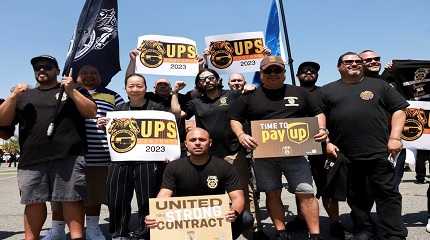
July 13 (Reuters) - A threatened U.S. strike at United Parcel Service (UPS.N) could be "one of the costliest in at least a century," a think tank specializing in the economic impact of labor actions said on Thursday.
Potential losses from a 10-day strike at the world's biggest package delivery company could top $7 billion, according to an estimate from Michigan-based Anderson Economic Group (AEG). That number includes UPS customer losses of $4 billion and lost direct wages of more than $1 billion.
UPS handles roughly a quarter of U.S. parcel deliveries and serves virtually every city and town in the nation. A work stoppage at the company could delay millions of deliveries ranging from Amazon.com (AMZN.O) orders to electronic components and lifesaving prescription drugs, shipping experts warned. They said it also could reignite costly supply chain snarls.
Talks are deadlocked between the company and the International Brotherhood of Teamsters union, which represents some 340,000 UPS employees who sort, load and deliver packages in the United States.
The Teamsters have vowed to strike if a deal is not ratified before the current contract expires at midnight on July 31.
"Consumers are going to feel this within days," AEG CEO Patrick Anderson said, noting that the risk is highest for critical medical supplies including chemotherapy medicines, some of which are already in shortage.
Medical therapies account for a small fraction of UPS volume but "the consequences of them being delayed by a week or 10 days could be potentially very serious," Anderson said.
A sticking point in negotiations is pay increases for part-time workers who account for roughly half the UPS workforce. Tenured part-timers are particularly frustrated because they make just slightly more than new hires whose wages have jumped in a tight labor market.
The company is urging the union to return to the table, but union officials say UPS needs to sweeten its offer for workers who risked their lives during the pandemic to help the company generate outsized profits.
UPS has two unappealing choices: Risk a strike and resulting customer losses or acquiesce to Teamster demands that could worsen the company's labor cost disadvantage versus nonunion rivals in an inflationary environment, Stifel analyst Bruce Chan wrote in a recent note.
"Both situations would create pain for UPS, so it could just be a question of when and how the company wants to take its medicine," Chan said.




